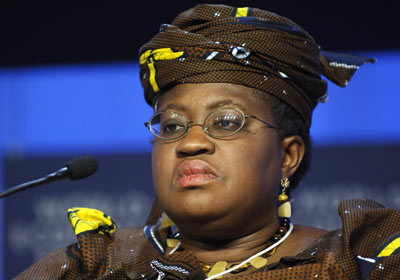Nigeria will begin to feel the impact of the global slump in oil prices from this November, the Minister of Finance, Dr. Ngozi Okonjo-Iweala, said on Thursday.
Crude oil sales are the dominant source of revenue for Nigeria, accounting for more thn 80 per cent of foreign exchange earnings.
Cumulative effects of many years of poor planning and weak saving culture have ensured that Nigeria struggles each time oil prices plummet.
Global oil prices have dipped starting from June, a development blamed on increasing production by major oil consuming nations like US and international politics around developments in Russian-Ukrain crisis.
Okonjo-Iweala said the country should be prepared to face for tougher times ahead by reviewing its expenditures and building economic buffers through budgets that would be based on modest oil prices.
The finance minister, who has been the force behind measures taken by the Federal Government to create savings for the rainy day, urged all tiersof government in the country to embrace sound macroeconomic management.
She spoke in Lagos at the Africa Financial Summit organised by the Institute of International Finance and Access Bank Plc.
“We have not seen the impact of the falling oil prices in Nigeria; it will start this month. We have to drive the non-oil revenue base to be able to weather the storm that is coming,” Okonjo-Iweala said.
She, however, said Nigeria was not alone in the coming economic storm, pointing out that a large number of African countries that relied on commodity export as the mainstay of their economies would also be affected by the global fall in the prices of such commodities.
The minister said the global fall in the prices of export commodities such as gold, iron ore and agricultural produce such as cocoa, cotton and coffee was bound to affect most African economies, which relied on commodity export as the major source of revenue.
Quoting from the United Nations Conference on Trade and Development,
According to Okonjo-Iweala, the ratio of export commodity to total merchandise was very high in a large number of African countries.
Citing examples she said, it is 60 per cent in South Africa; 89 per cent in Zambia and Ghana; 96 per cent in the Democratic Republic of Congo; and 83 per cent in Nigeria.
She said based on the 2013 data, 70 per cent of sub-Saharan Africa’s merchandise exports went to regions that were currently facing slowdown.Ten per cent of commodity exports from the sub-Saharan Africa go to the US; 26.5 per cent to Europe; three per cent to Japan; 21 per cent to China; and three per cent to Brazil, according to the minister.














